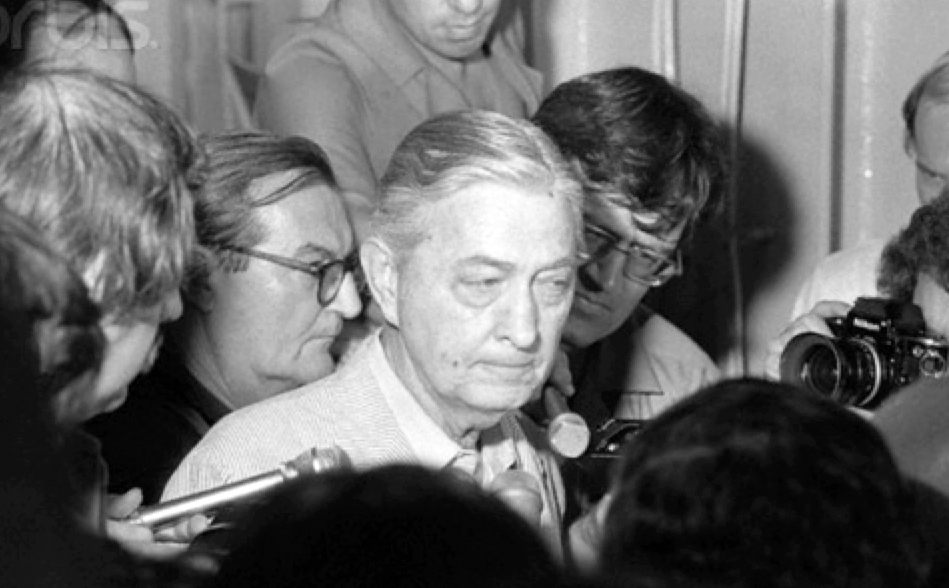In the days before fake news and blogging – back when the term “fair and balanced” didn’t mean biased and skewed – professional journalists dedicated to the factual reporting of real news roamed the earth. One of the best was Anthony Marcus Paul, an American educated Australian who covered Asia from 1972 until his death last month at age 81.
Tony Paul was a gifted editor and war correspondent, whom I met in 1977 when both of us were based in Hong Kong. We covered Southeast Asia, myself for Time Magazine and Tony for the Reader’s Digest, which at that time was the world’s largest selling magazine with a circulation of 23 million.

Tony Paul, partially hidden in the shadow of U.S. Ambassador Graham Martin, with other journalists on the USS Blue Ridge following the fall of South Vietnam
Asia was changing rapidly. Vietnam and Cambodia had fallen to communism only two years before. China was just starting to recover from its Cultural Revolution. The Philippines was entering its fifth year of martial law while Burma, poor Burma, silently disintegrated under socialist Ne Win.
My arrival coincided with the publishing of Paul’s book, Murder in a Gentle Land. Based on 300 interviews conducted alongside co-author John Barron, the book documented the brutality of the Khmer Rouge and put to rest any lingering notion that Indochina’s communist revolutionaries were liberators.
Tony was president of the Hong Kong Foreign Correspondents Club and a mentor to young writers. Many American correspondents came to Asia knowing little more than that there had been a war in Vietnam and that 1965 was Indonesia’s year of living dangerously. Few of us had ever heard about the 12-year Malayan Emergency, a vicious jungle war where the terms counter insurgency, strategic hamlets, and hearts and minds first emerged. Paul educated us on the anti-British insurgency that set the stage for future conflicts in Indochina.
In 1997, Paul tracked down Chin Peng, the nearly forgotten Malaysian Chinese communist leader who secretly was living in Southern Thailand. It was symptomatic of Tony’s style that in addition to interviewing the jungle fighter he invited the old guerilla to lunch at the British Club in Bangkok. It was an irony that both of them relished.
During the early 1980s, following the Soviet Union’s December 1979 invasion of Afghanistan, every Western news organization was demanding first hand reporting from occupied Afghanistan. Where do the Russians live? Are there Russian bars? Where do their kids go to school?
Unfortunately, Kabul was not giving visas to journalists. Some writers simply lied about their profession, claiming to be educators or teachers. U.S. publications generally forbad staff writers from misrepresenting themselves. So I asked Tony, an inveterate collector of Asian antiques, how he managed to enter Afghanistan with such apparent ease.
“I go in as a carpet buyer,” he smiled, gesturing expansively around a Hong Kong apartment carpeted with Asian rugs.
“But don’t you have to show that you’ve bought a dozen or more when you leave the country?” I asked.
“I just explain that I was trying to buy green carpets,” Paul winked. Since green is the color of Islam no Afghan weaver ever would make a green carpet for fear it might be walked on.
After leaving the Digest, Paul became the founding editor of two other Asian publications, Business Tokyo, which he edited out of Japan and New York, and Asia Inc., a business monthly launched in Hong Kong in 1992. Asia Inc. subsequently won the Citibank Pan Asia Journalism Award three years in a row. He subsequently went on to Fortune Magazine as a contributor and the Straits Times in Singapore, where he wrote a regular column.
From 1992 until 1998 when the Asian economy imploded, I worked with Tony for the Manager Media Group, a Bangkok company that published Asia, Inc. and, later, the business daily Asia Times. The goal of the company was to become the Time Inc. of Asia, but, alas, our founder was no Henry Luce. Under Tony’s leadership, however, both publications consistently produced excellent journalism.
There are many stories associated with the career of Tony Paul. As a correspondent, most involve persistence. As an editor he was know for insistence on accuracy and lack of political agenda.
Of course, the great thing about life is that it goes on. Talent and integrity are not finite. Other editors will mature and mentor young reporters. But, for now, the death of Anthony Marcus Paul leaves a painful void in our profession. He will be missed.
– 30 –


